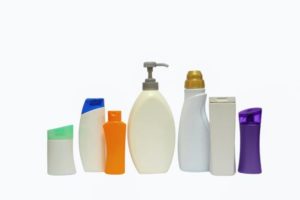 Think that BPA-free products are safe? Oops... it doesn't look like it. The most common replacement for the commonly used chemical compound BPA (bisphenol A) is BPS (bisphenol S). But it has become very clear that both are hormone disrupting chemicals with numerous and harmful health effects, especially reproductive disorders.
Think that BPA-free products are safe? Oops... it doesn't look like it. The most common replacement for the commonly used chemical compound BPA (bisphenol A) is BPS (bisphenol S). But it has become very clear that both are hormone disrupting chemicals with numerous and harmful health effects, especially reproductive disorders.
BPA and BPS are plasticizers used in products all around us, for example in food packaging containers, water bottles, baby bottles, can linings, toys, personal care products, cash receipts, dental sealants and on and on. Because it leaches out of products, BPA has been detected in the urine of nearly every person tested, as well as in breast milk, amniotic fluid, the placenta, and the blood of pregnant women (meaning it's getting to developing babies and causing effects).
Thus the desire for BPA-free products, and why industry has substituted chemically related BPS. But BPA-free doesn't mean it's safe or without problems if BPS or BPSIP (another chemically related substitute) are used. Similar chemicals often cause similar problems, which is what is happening. BPS is also being found in the urine of the great majority of people tested (which means humans are being widely exposed to it).
Research using BPS has been worrying - it actually seems to be worse for health than BPA. The latest research (by University Of Guelph researchers), which was conducted on mice, suggests that BPS has rapid effects (in a negative way) on heart functioning. Within minutes of exposure (at levels comparable to typical human exposure), heart function worsened, especially in female mice.
What can you do to lower exposure to hormone disruptors BPA and BPS? One can't avoid chemicals such as BPA and BPS totally, but you can definitely lower your exposure by taking the following steps (as much as possible). The good news is that BPA and BPS leave the body rapidly - so the goal should be to try to limit new exposure.
SOME STEPS FOR LOWERING EXPOSURE: 1) Assume that a "BPA-free" product is using similar hormone disruptors (such as BPS) and so avoid it. 2) Buy and store food in glass or stainless steel containers (and not in plastic containers). 3) Use ceramic or glass plates in the microwave. Don't use any sort of plastic containers or pouches in the microwave. 4) Use fragrance-free products. Avoid products with fragrances in them, including air fresheners, scented candles, detergents, dryer sheets, and personal care products. 5) Avoid flexible vinyl (e.g. shower curtains - use cloth shower curtains and liners instead), 6) Use glass baby bottles, and 6) Wash hands before eating (everything gets on the hands!).
From Medical Xpress: BPA replacement hinders heart function, study reveals
BPA's counterpart replacement BPS can hinder heart function within minutes of a single exposure, according to a new University of Guelph study. The study is the first to show the instant effects bisphenol S (BPS) can have on the heart.
"We expected to find similar effects from BPS as we have with BPA, but not at the speed that it worked," said biomedical sciences professor Glen Pyle, who conducted the study with former master's student Melissa Ferguson. "This replacement chemical seems to be more potent."
Bisphenol A (BPA), a chemical used in plastic products, was banned from baby bottles in Canada in 2010 over concerns that it may leach into foods and cause hormone-related side effects. More manufacturers are now using BPS as a replacement in their products and labelling them as BPA-free.
When mice were given bisphenol BPA or BPS in amounts that mimicked typical human levels, their heart function worsened, especially in females, within minutes of exposure.
These findings are concerning, as endocrine receptors and metabolic pathways are similar in mice and humans, said Pyle.
"This study raises concerns about the safety of BPS as a replacement for BPA." It's particularly worrisome for people with coronary heart disease, high blood pressure, diabetes or obesity, because the effects of BPS could increase the chance of a heart attack or make a heart attack more severe, he added.
Published recently in the journal Scientific Reports, the study entailed treating mouse hearts with BPA and BPS at levels typically seen in people. Each chemical on its own was found to depress heart function by dampening heart contractions causing slower blood flow. However, BPS had a quicker impact—within five minutes of exposure.
"Previous research has looked at the chronic effects that can happen when exposed to BPS over days," said Pyle. "But we are the first to show how fast BPS can work. This is an important finding because it means you don't need to have a buildup of the chemical over time to experience its harmful effects."
BPA is found in plastics used for food packaging, including liners for metal cans and other containers, as well as in medical devices such as hospital intravenous lines and dental sealants.
Although the body gets rid of bisphenols quickly, their ubiquitous use in so many consumer goods means that the substance persists.
